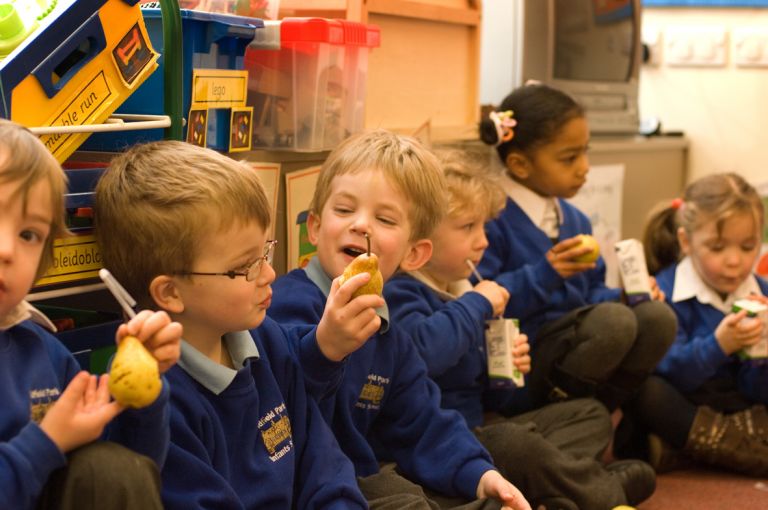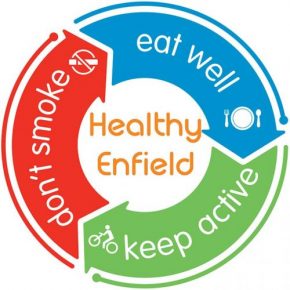The FELIX project
Schools programme
The Felix Project schools programme provides a free weekly delivery of fresh food for children and their families to take home. They aim to deliver to every primary school in the Enfield borough.
What is provided:
- A minimum each week of 5 crates of produce including fresh fruit and vegetables
- Paper bags with the Felix Project logo for children to take food home in (if required)
- Support and advice to help with set up
Process:
- A signed Service Level Agreement is required
- Agree your preferred day/time for delivery
- Delivery procedure - gaining access, security, phone call in advance etc
- Decide whether food that requires refrigeration is able to be accepted
To arrange a meeting or to find out more, contact Anne Elkins at schools@thefelixproject.org or 07428 571696.

Whole school approach
Healthy eating checklist
This checklist is ideal for head teachers and includes ideas for improving and increasing uptake of school meals. It features:
- Ways to make school meal times better and ensure children have a healthy, balanced meal.
- Ideas for a ‘whole-school’ approach.
- Tips for engaging parents and the community.
Food for Life schools award
The Food for Life schools award supports schools to take a whole school approach.
Includes: grow your own food; trips to farms; sourcing food from local producers school farmers’ markets; community food events; cooking and growing clubs and more.
Teaching food in primary
Developed by the British Nutrition Foundation, Teaching food in primary: the what, why and how is based on the National Curriculum (England).
Please visit Healthy Schools London for additional information and resources.
Food growing schools
The Food Growing Schools London partnership brings together food growing expertise, information and support, with the ambition to inspire and equip every school in London to grow their own food.
Resources available to implement a food growing program include: school and community engagement officers, school learning resources, activities and campaigns.
Benefits include: supporting curriculum learning, improving health and mental well being, creating a positive food culture, building links with the community, protecting the environment and giving a boost to the local economy.
Food for Life resources
For further information please contact Lisa Grant at lgrant@gardenorganic.org.uk.
Sugar Smart
Join the Enfield schools who are already taking steps to help students reduce their sugar intake.
- Once a week, introduce a dessert containing 100% fruit
- Make drinking water available in dining areas and throughout the day
- No sugary drinks allowed in packed lunches
- Promote the uptake of school meals
- Ensure that all meals served in school meet school food standards
- Ensure that food at classroom parties and functions is not high in sugar
- Encourage staff to model healthy eating
- Conduct low sugar recipe demonstrations to encourage better choices
- Teach children where food comes from and grow produce together
- Produce a sugar smart recipe book for parents
- Use student council meetings or PSHE classes to debate sugar issues
- Set a challenge, such as giving up sugary drinks for a whole week
- Run competitions for healthy eating within the school
- Include nutritional workshops in the core PE lesson programme
- Run a Sugar Smart assembly using video and information resources
- Make viral content such as videos to share on social media channels
- Run a quiz with facts about sugar in everyday food and drink
School resources
Posters for display around your school or near a vending machine:
Classroom resources
Lesson plans
- Lesson plan - Sugar (PDF, 332.73 KB)
- Lesson plan Y1- Honey
- Lesson plan Y2- Food sources (PDF, 909.69 KB)
Class activities and exercises
- Label quiz (PDF, 2268.28 KB)
- Sugar Smart quiz (PDF, 204.99 KB)
- Joseph food explorer (PDF, 4168.74 KB)
- The sugar story (PDF, 3739.33 KB)
- Sugar ranking exercise (PDF, 1896.86 KB)
- Supermarket sugar swap (PDF, 350.39 KB)
- Teaspoons of sugar - guessing game (PDF, 1812.25 KB)
- Weekly diary (PDF, 296.92 KB)
- Word search (PDF, 193.94 KB)
Recipes
Water only schools
Being water only means making sure that water (and plain semi skimmed or skimmed milk, lactose free or soya milk) is the only drink in your school.
By choosing water, this means children are not drinking sugary drinks which contribute to many preventable health conditions like obesity, tooth decay and type 2 diabetes. Becoming water only is also economical and environmentally friendly – one litre of tap water costs less than a fifth of a penny, 500 times less than bottled water and by using reusable water bottles we can help cut single-use plastics.
See link for resources including a toolkit (how to become water-free, frequently asked questions and letters for parents), posters and certificates for pupils.
Request stickers
‘Water Only’ waterproof stickers are available for pupils to stick on their re-useable water bottles.
Please contact wateronly@london.gov.uk with your name, school, postal address and quantity of stickers required if you would like stickers for your school.
Case study - Charlton Manor Primary school, Greenwich
Tim Baker, Headteacher in Greenwich, has created a blog detailing the school journey to be Water Only
